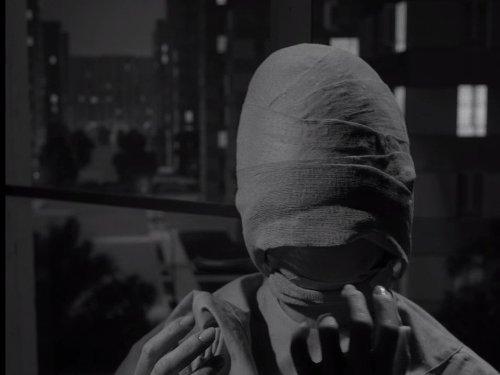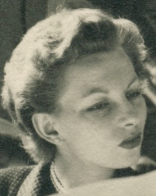 “Everything built to perfection, father: everything designed for a perfect life.”
Title:
“Everything built to perfection, father: everything designed for a perfect life.”
Title: “The Lateness of the Hour”
Original transmission date: December 2 1960
Written by: Rod Serling
Directed by: Jack Smight
Starring: Inger Stevens as Jana
John Hoyt as Dr. Loren
Irene Tedrow as Mrs. Loren
Setting: Earth
Timeframe: Present (at the time)
Theme(s): Loneliness, fear, isolation, paranoia, robotics, control, hubris
Parodied? Not to my knowledge, no
Rating: B
Serling's opening monologue
The residence of Dr. William Loren, which is in reality a menagerie for machines. We're about to discover that sometimes the product of man's talent and genius can walk amongst us untouched by the normal ravages of time. These are Dr. Loren's robots, built to functional as well as artistic perfection. But in a moment Dr. William Loren, wife and daughter will discover that perfection is relative, that even robots have to be paid for, and very shortly will be shown exactly what is the bill.
Another dark and stormy night. A woman looks out at the rain, then brings a photo album to her mother, asking questions about people in it. Shown a picture of the maid (who is currently giving her mother a neck massage) she remarks that the woman in the photo looks no older than the maid does now. She seems ill at ease, but her parents are quite relaxed. The daughter, Jana, seems troubled, even annoyed at how perfect the house is, commenting on how the windows let in the exact amount of light required, how the ceilings are acoustically perfect, how the temperature is set to the optimum for comfort.
Her irritation increases as she asks plaintively why they have to do everything the same every day - eat at the same time, in the same place, never going out, never doing anything new, but her concerns are gently rebuffed by her father. This only sends her into higher frenzies of frustration, as she asks why they can’t go out, why they must spend all their time endlessly wasting away in this dark, mouldering house, why silent servants see to her and her parents’ every whim, and finally she loses it and throws one, Nelda, the one who was giving her mother a massage, down the stairs.
But Nelda does not break her neck, or scream, or sustain any injury, and Jana’s father reminds his daughter that these are not real people, that he built them, and they are indestructible. The house is served by a staff of robots, but Jana worries that her parents are becoming so dependent on them that the robots are starting to control them, instead of serving them. She says that soon, her parents won’t be able to take care of themselves and will be at the mercy of these automatons. Her father assures her that she is here for her safety and security, but she is going slowly mad cooped up in what she terms, seemingly accurately, a mausoleum.
Jana finally gives her parents an ultimatum: destroy the robots or she will leave the house. Her father begs her not to go, but when he sees she will not change her mind, that it’s her or the robotic servants, he promises, with a heavy heart, to grant her wish. He orders the robots to go down to his workshop and wait there. They argue, but cannot disobey and when Jana finds they’re all gone she’s delighted, making plans for a real life. Her parents, however, seem upset, and there’s a secret they have to impart to her. She’s a robot too. They built her as they had no children, gave her the memories of her childhood, but she realises she can’t feel pain, or love (though she can feel anger: weird). In the end, the father reprograms her as his wife’s new maid. Should have kept her mouth shut, I guess!
Serling's closing monologue
Let this be the postscript — Should you be worn out by the rigors of competing in a very competitive world, if you're distraught from having to share your existence with the noises and neuroses of the twentieth century, if you crave serenity but want it full time and with no strings attached, get yourself a workroom in the basement, and then drop a note to Dr. and Mrs. William Loren. They're a childless couple who made comfort a life's work, and maybe there are a few do-it-yourself pamphlets still available... in the Twilight Zone.
The Resolution
It’s pretty much telegraphed isn’t it? Other than the parents actually being robots too I don’t see how else this could have ended. Meh.
The Moral
Shut up and listen to yer dad
Themes
Robotics again, only the third I think, and the first in the second season, with of course entirely unbelievable androids completely indistinguishable from real humans. Of course, we’re not told what time this is in, but with respected movies like Forbidden Planet using Robby the Robot as the template for what was seen as possible in the field of robotics, like the awful “The Mighty Casey”, this one’s hard to believe. Loneliness and isolation are dealt with here too, as Jana feels like she’s suffocating in the big house with just her parents and these robots, and everything so regulated. Fear, paranoia and the loss of control, as she tells her parents they are so dependent on the robot servants that the roles have all but been reversed, and finally hubris too, as Jana’s mouth gets her into a whole lot of trouble.
And isn't that...?
 Inger Stevens (1934 - 1970)
Inger Stevens (1934 - 1970)
In a slice of that “truth is stranger than fiction”, Stevens’s mother ran away from the family at an early age and her father left her in the care of a maid; interesting as the main focus of this episode is Nelda the maid, who seems a little lippy and sarcastic for a servant, even a robot one. Stevens starred alongside some true Hollywood giants, including Clint Eastwood, Dean Martin, Harry Belafonte, Bing Crosy, Robert Mitchum and Henry Fonda. Her death was ruled a suicide, poisoned by barbiturates.
She was also Nan Adams in the season one episode “The Hitch-Hiker”.
 John Hoyt (1904 - 1991)
John Hoyt (1904 - 1991)
If the cast list of this episode doesn’t quite read like a roll call of Hollywood royalty, these people certainly rubbed shoulders with them. Hoyt was in the classic historical movies
Cleopatra (therefore acting with Taylor, Burton, McDowell, Landau and Harrison) and
Spartacus, sharing a film set with Kirk Douglas, Sir Laurence Olivier, Tony Curtis, Jean Simmons and Charles Laughton, and, um,
Flesh Gordon. Yeah. Moving on, he was also the original doctor on the
Enterprise in the pilot “The Cage”, quickly dropped for DeForest Kelley’s Leonard “Bones” McCoy, and he had a funny side (not displayed in
Star Trek) as a stand-up comedian. He had a part in another classic science fiction movie,
When Worlds Collide, and also played in the classic movie that saw, as it were, the birth of rock and roll,
Blackboard Jungle. One of his last roles was in
Desperately Seeking Susan, alongside Madonna.
Side note: one of his earlier movies was called
Attack of the Puppet People, which, with a little stretching of the meaning, you could apply to robots, especially robot servants, for after all, are they much more than puppets? Jana describes them as toys, or at least the house as a toyhouse. He was also in
Curse of the Undead, and again, that might apply to robots too, not to mention The Company She Keeps, which could describe Jana.
Questions, and sometimes, Answers
If they wanted to give Jana the best life they could, and keep her as happy as possible, why did the parents insist on sticking to such a rigid schedule? Would it have killed them to, as Jana says, have dinner ten minutes early or late, or let her go out, even if only to the garden? Were they really becoming little more than robots themselves, without knowing it? And while we’re at it, if they ate dinner as a family how did Jana eat? Did Dr. Loren design her so perfectly that she was able to consume food, or at least think she was doing so? Or did he put in some subroutine or something so that she didn’t realise she wasn’t eating?
If he was such a genius and could reprogramme her, why didn’t Loren just erase her memory of discovering she was a robot and let her continue on as his daughter? Was it because he and his wife knew that she knew, and then things could never be the same?
I have no idea where the title comes from. If anyone knows, please enlighten me. My theories are that a) it opens in the evening, and that’s when she discovers she’s a robot or b) it might refer to the “autumn of your life”, referencing the parents. Neither seem that likely though, and I’m thinking it may be a quote from something?
Sussed?
Oh yeah, after about five minutes. When it was obvious the parents weren’t vampires or some long-lived, immortal beings I knew where this was going. For the time, I’m sure it was shocking and ground-breaking, but now, with all we’ve seen and read, a little easy to predict.
The WTF Factor
Given that I was just waiting for the payoff, pretty much zero really.
Personal Notes
Dammit I wish Americans would stop saying ro-buts. It’s ro-bott, you fools! Even Serling says it, although to be fair the characters don’t. Why the confusion? It’s spelled with an o, folks, not a u.
Also, the almost sexual noises Mrs. Loren makes when getting her neck massages are extremely disturbing, given that she’s so old. I have no idea why Serling thought they needed to be included; they don’t add anything to the storyline and seem very much out of place.
I’ll check back, but I feel this may be the first opening monologue in which Serling does not use the words “the Twilight Zone” at all (though there are in the closing one).




















 Linear Mode
Linear Mode
